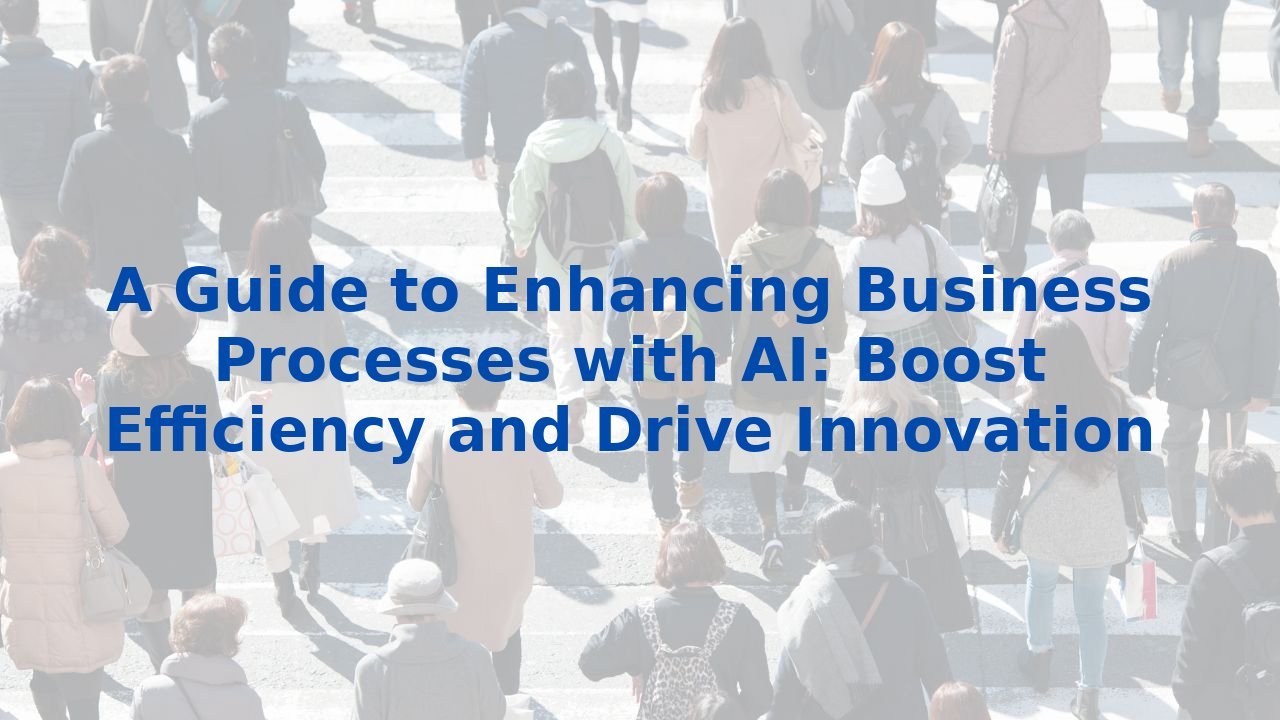A Guide to Enhancing Business Processes with AI: Boost Efficiency and Drive Innovation
Enhancing Business Processes with AI: A Guide to Efficiency and Innovation
In today's fast-paced business landscape, the quest for efficiency and innovation is relentless. Companies are constantly seeking ways to streamline operations and improve performance. Enter Artificial Intelligence (AI)—a game-changing technology that promises to redefine how businesses operate by automating tasks, optimizing processes, and empowering data-driven decision-making. In this guide, we will delve into the transformative ways AI can enhance various business processes and explore the undeniable advantages of integrating AI into your organizational strategy.
1. Automating Routine Tasks
One of AI’s most compelling advantages is its ability to automate mundane tasks. These are the repetitive, time-consuming activities that can bog down productivity. Think data entry, scheduling meetings, or managing email responses—AI can take these off the table, allowing employees to devote their energy to more strategic initiatives. By minimizing human error and freeing up time, AI sets the stage for a workforce that focuses on innovation.
“Imagine AI handling your meeting schedules while you brainstorm your next big idea.”
2. Predictive Analytics
Predictive analytics is another area where AI shines. By analyzing historical data, AI can forecast future sales trends, customer behaviors, and even potential supply chain disruptions. This proactive approach not only enhances decision-making but also equips businesses to stay ahead of the curve. Consider the impact of AI in logistics—optimizing inventory management based on real-time data transforms traditional supply chains into streamlined operations.
3. Risk Management
In a world where risk is ever-present, AI is a powerful ally. AI can identify vulnerabilities within your business model and predict potential pitfalls, such as financial downturns or fraud. By processing vast amounts of data, AI provides insights that alert businesses to discrepancies before they escalate into significant issues. This predictive power strengthens your organization's resilience against unforeseen challenges.
“AI isn’t just a tool; it’s your vigilant partner in navigating uncertainties.”
4. Enhancing Product Development
In the fast-moving world of product development, AI can be a game changer. By analyzing customer feedback and market trends, AI accelerates the development cycle, enabling rapid prototyping and iteration. Furthermore, it can help sales teams identify high-potential leads and refine their strategies for upselling and cross-selling. The result? Products that meet customer needs more effectively and a sales team that operates with precision.
5. Process Optimization
AI's role in process optimization cannot be overstated. By examining data from various sources and recognizing patterns, AI facilitates process discovery. It visualizes workflows, identifies bottlenecks, and alerts management to potential issues in real time, empowering organizations to act with agility and make data-informed adjustments that enhance efficiency.
“AI transforms chaos into clarity, providing a roadmap for process excellence.”
6. Automation and Decision-Making
Automating manual tasks with AI translates to faster processes and reduced errors. More importantly, AI enhances complex decision-making by simulating alternative scenarios and providing insights based on comprehensive data analysis. This capability enables organizations to make informed decisions swiftly and confidently—an essential trait in today's competitive landscape.
Benefits of AI Integration
1. Improved Efficiency: The reduction of manual labor through automation allows for better resource allocation, minimizing errors and optimizing processes.
2. Enhanced Decision-Making: Accurate, timely insights facilitated by AI enable businesses to make informed, confident decisions.
3. Cost Reduction: AI’s ability to streamline operations leads to significant cost savings, reducing overhead and increasing overall profitability.
4. Better Compliance: Consistent and thorough monitoring by AI helps organizations adhere to industry standards, reducing the risk of penalties.
5. Enhanced Customer Satisfaction: AI offers personalized interactions, faster responses, and keeps a finger on the pulse of customer feedback, ultimately leading to increased satisfaction rates.
Training Employees for AI
While AI is undoubtedly a powerful tool, its full potential can only be unlocked through effective employee training. When employees understand how to utilize AI tools, the benefits multiply exponentially.
1. Increased Productivity: Well-trained employees leverage AI efficiently, driving higher productivity rates and higher-value outcomes.
2. Improved Decision-Making: Employees who comprehend AI insights can make better-informed decisions that align with organizational goals.
3. Enhanced Adaptability: Training fosters agility, allowing employees to seamlessly integrate new AI tools into their workflows.
4. Better Collaboration: A culture of collaboration flourishes when teams are trained together, optimizing efforts to achieve business objectives.
In conclusion, embracing AI is no longer an option; it’s essential for organizations aiming to enhance efficiency and stimulate innovation. From automating routine tasks to streamlining product development, the benefits of AI are profound. By committing to employee training in AI technologies, businesses can not only realize these benefits but exceed their operational goals and stay ahead in a rapidly evolving marketplace.
Explore more about enhancing your workforce with AI through comprehensive training programs to harness the full potential of this transformative technology.



